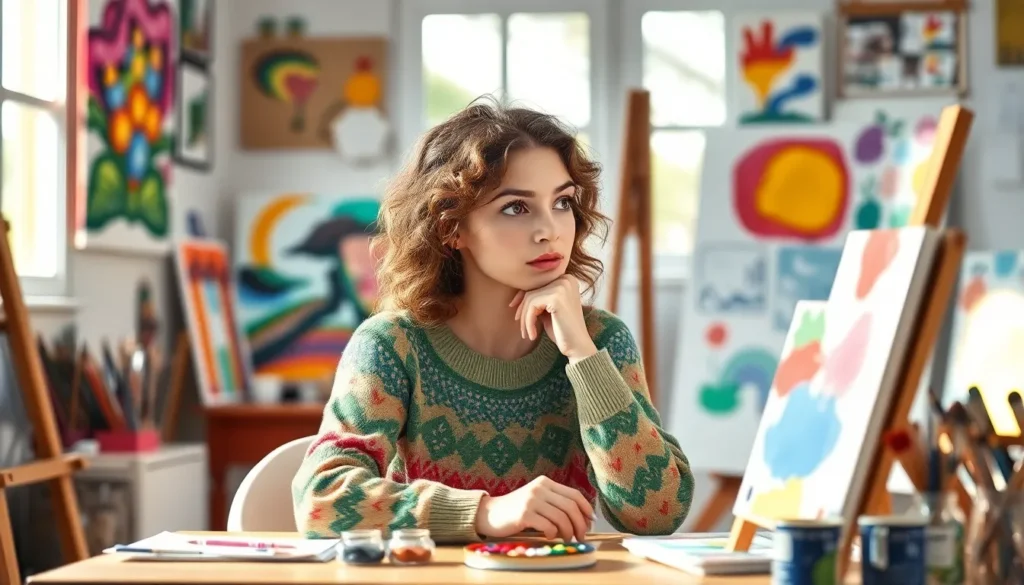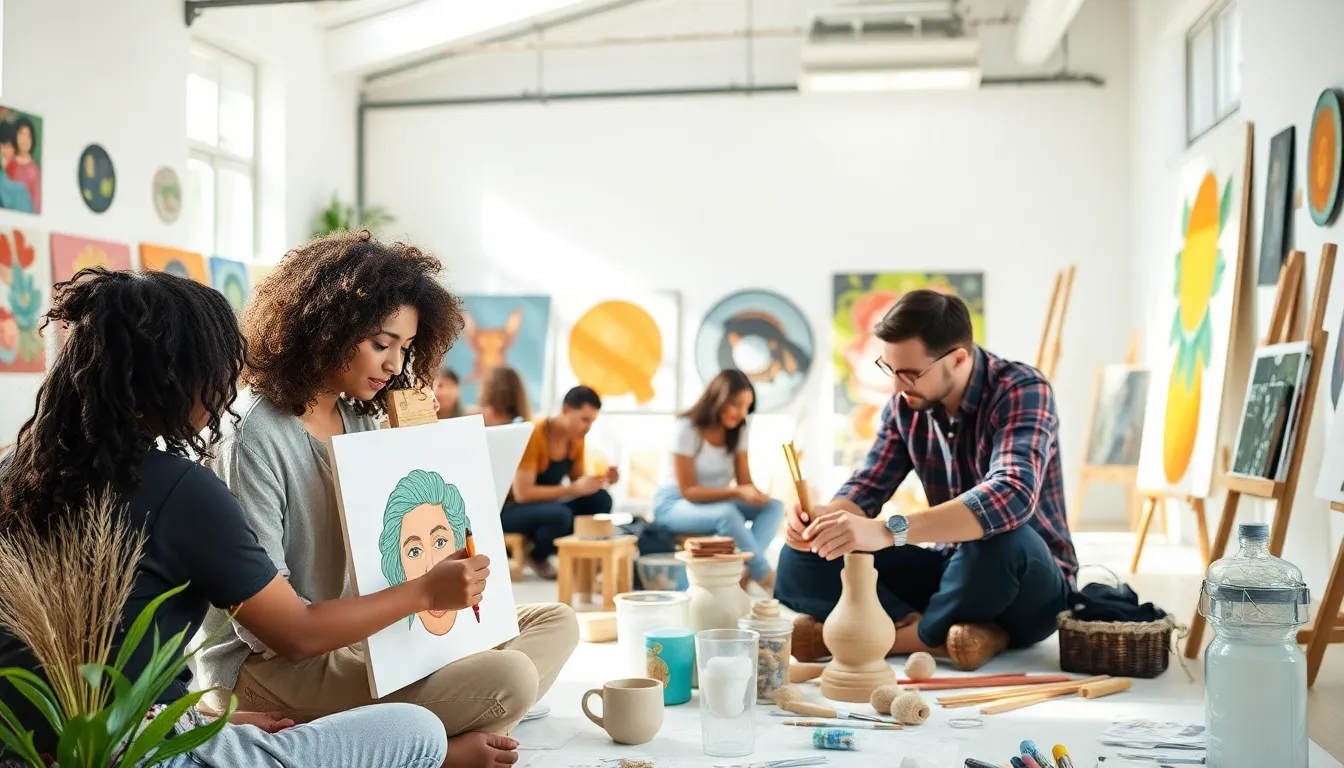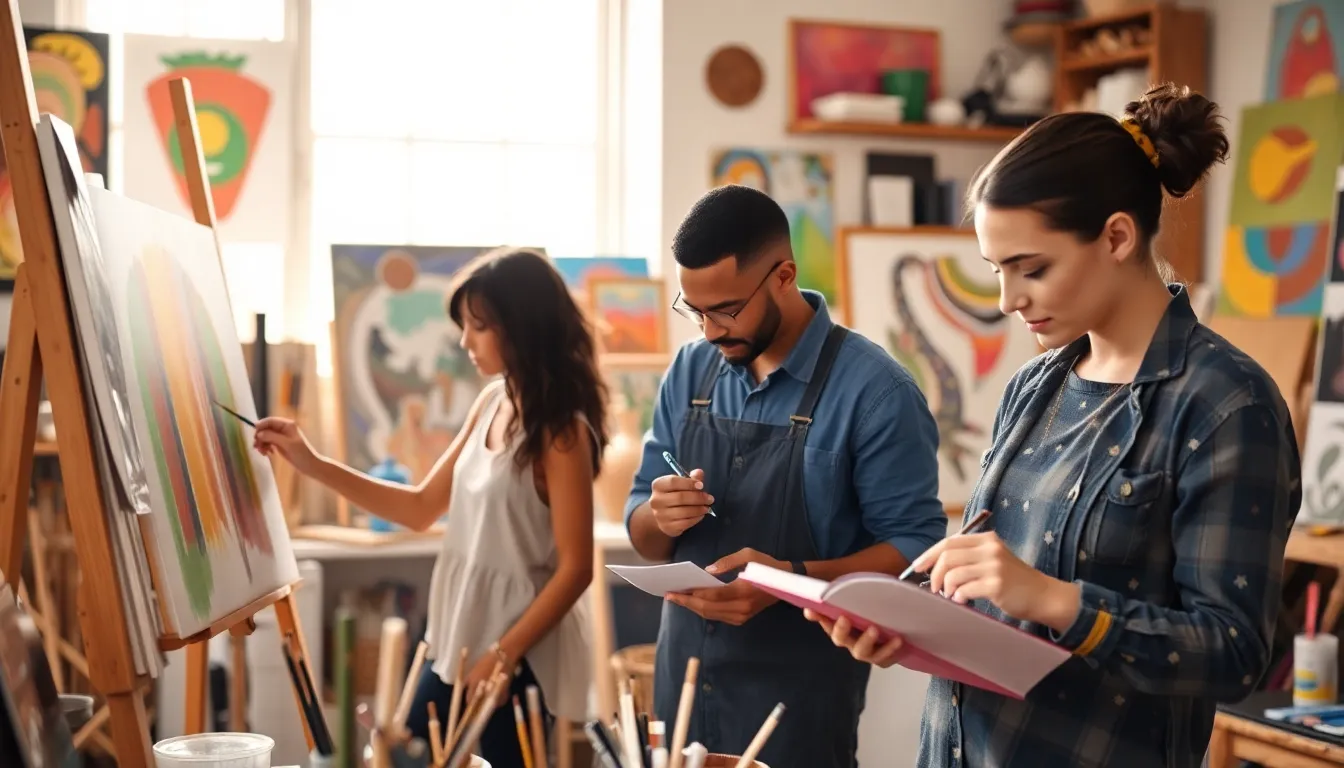
Creatives often walk a tightrope between inspiration and anxiety, where ideas flow like a river one moment and dry up the next. This rollercoaster ride can leave them feeling like a juggler with too many balls in the air. Enter therapy, the secret weapon that can help them reclaim their artistic mojo while keeping their sanity intact.
Imagine having a personal cheerleader who not only listens but also helps untangle the knots of self-doubt and creative blocks. Therapy for creatives isn’t just about venting frustrations; it’s about unlocking potential and discovering new ways to express oneself. It’s like having a GPS for the mind, guiding artists through the winding roads of their imagination. So why not explore how therapy can transform creative chaos into a masterpiece?
Therapy for Creatives
Therapy plays a crucial role in supporting creatives navigating the complexities of their emotional landscapes. Understanding the intersection of mental health and creativity is vital for fostering a thriving artistic environment.
The Importance of Mental Health in Creative Fields
Mental health significantly impacts creative output and overall well-being. A stable emotional state encourages more productive thought processes, allowing for the free flow of ideas. Many artists face intense pressure, and therapy offers tools to manage stress and anxiety. This support nurtures resilience, empowering creatives to express themselves authentically. Practicing self-care alongside creative pursuits leads to better mental health outcomes, enhancing artistic expression. Prioritizing mental wellness ensures that artists maintain passion and inspiration throughout their journeys.
Common Challenges Faced by Creative Individuals
Creative individuals encounter various challenges that can hinder their artistic endeavors. Self-doubt often emerges as a barrier, stifling innovation and confidence. Many also experience anxiety related to performance and critique, complicating their creative processes. Burnout commonly occurs, leading to a decline in motivation. Isolation can exacerbate these challenges, creating a feeling of disconnect from peers. Artists frequently grapple with the fear of rejection, affecting their willingness to share work. Addressing these challenges through therapy promotes healthier coping mechanisms, paving the way for renewed creativity.
Types of Therapy Beneficial for Creatives


Therapy offers various modalities that can significantly benefit creatives. Each type addresses unique challenges faced in artistic pursuits.
Art Therapy
Art therapy utilizes creative expression as a therapeutic tool. Participants engage in activities like painting, drawing, or sculpting to explore emotions and ideas. This process often helps to unlock feelings that words cannot capture. By focusing on the process rather than the end product, artists find a safe space to experiment freely. Additionally, art therapy supports self-discovery and enhances emotional insight, making it particularly valuable for those struggling with self-doubt. Such sessions encourage personal growth and healing through artistic exploration, fostering a deeper connection with their creative self.
Cognitive Behavioral Therapy
Cognitive Behavioral Therapy (CBT) focuses on identifying and restructuring negative thought patterns. This approach helps creatives manage anxiety and self-doubt effectively. Through cognitive restructuring, individuals learn to challenge and change unhelpful beliefs about their art and self-worth. Behavioral techniques reinforce positive habits, leading to enhanced performance. CBT equips artists with tools to cope with creative blocks, replacing harmful thoughts with constructive ones. This therapy often partners effectively with other artistic processes, promoting a more positive mindset and fostering resilience in their creative endeavors.
Expressive Therapy
Expressive therapy encourages individuals to communicate through various creative outlets. Techniques can include music, dance, poetry, or drama, allowing for personal expression. Each creative medium provides a unique avenue for exploration and healing. This form of therapy often helps individuals process complex emotions that traditional talk therapy may not address. By engaging dynamically with their emotions, creatives discover new facets of their identity. Overall, expressive therapy nurtures a supportive environment for exploration, enhancing emotional well-being and promoting authentic self-expression.
Benefits of Therapy for Creatives
Therapy offers numerous advantages for creatives, addressing unique challenges inherent in artistic pursuits. Engaging in therapeutic practices fosters emotional resilience, enhancing creative output and overall well-being.
Enhancing Creativity
Therapy nurtures the creative process by cultivating a deeper understanding of emotions. Exploring thoughts and feelings in a safe environment allows artists to access previously untapped sources of inspiration. Techniques like art therapy encourage experimentation, which often leads to breakthroughs in artistic expression. Increased self-awareness promotes confidence, enabling creatives to take risks in their work. Such support leads to innovative ideas, transforming artistic visions into tangible realities.
Overcoming Creative Blocks
Therapeutic approaches effectively address and resolve creative blocks. Cognitive Behavioral Therapy (CBT) aids individuals in identifying and challenging negative thought patterns that stifle creativity. It encourages practical strategies for managing anxiety and self-doubt, vital components in creative blocks. Expressive therapies provide alternative outlets that stimulate new ways of thinking. These practices enhance the ability to navigate creative obstacles, fostering a more fluid artistic process. Ultimately, therapy acts as a catalyst for breaking through barriers, allowing unrestricted creative expression.
Finding the Right Therapist
Finding a therapist who understands the unique challenges faced by creatives can significantly impact emotional wellness and artistic expression. Selecting the right professional involves ensuring their expertise aligns with individual needs and preferences.
What to Look For
Seek a therapist with experience in mental health issues specific to creative individuals. Focus on those familiar with performance anxiety, burnout, and self-doubt. Prioritize therapists who offer modalities like art therapy or Cognitive Behavioral Therapy. Evaluate their communication style, ensuring it fosters a comfortable environment for open discussion. Consider their familiarity with creative processes and emotional complexities inherent to artistic pursuits.
Questions to Ask
Inquire about the therapist’s approach to working with creatives. Ask how they tailor their techniques to address specific challenges faced by artists. Understand their experience in handling performances anxiety or fluctuating inspiration cycles. Clarify their methods for promoting resilience and managing mental blocks. Explore their familiarity with various therapeutic modalities and how they can support individual artistic growth.

